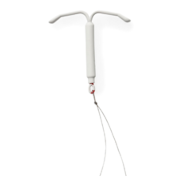IUD update: Kyleena and LILETTA
New and improved IUDs are coming soon to a health care provider near you.

Update: Kyleena is officially on the market, so you have more IUD options than ever! Talk to your health care provider about which IUD is ideal for you.
—
After a decades-long IUD drought in the U.S., it’s finally (figuratively) raining IUDs! There’s news about a brand new IUD that’s about to hit the market, and an update on one that was introduced only last year.
The newest IUD, Kyleena
Bayer—the maker of Mirena and Skyla—has announced that a new IUD called Kyleena is on its way.
So how does Kyleena compare to its cousins Mirena and Skyla? All three work thanks to the same hormone (levonorgestrel) to prevent over 99% of pregnancies, but Kyleena releases less hormone (17.5 micrograms/day) than Mirena (20) and more than Skyla (14). All of the hormonal IUDs on the market make periods lighter for most women. But because of the different amounts of hormone, a woman using each IUD has a different chance of her period going away after one year: 20% for Mirena, 12% for Kyleena, and 6% for Skyla. Like Skyla, Kyleena is slightly smaller and has a narrower inserter, so insertion may be less uncomfortable for those who haven’t had a child. If you plan waaaay in advance—which most humans don’t!—Skyla is good for up to three years, Kyleena for five, and Mirena for eight. Mirena is the only IUD in the Bayer IUD family that’s recommended to treat heavy and painful periods. It may also help reduce bleeding caused by fibroids and endometriosis.
It takes time for health care providers to get access to new birth control methods, so if you’re interested in Kyleena, call your provider to find out when they might have it.
LILETTA gets better and better
The FDA considered new information and decided to increase LILETTA’s approved use to 8 years!
Getting an IUD inserted isn’t exactly a walk in the park for most people, so we’re all in favor of anything that makes the process faster. LILETTA is introducing a new, simpler inserter that may help do just that. Health care providers will have access to this new inserter this fall.
We’re glad that the IUD drought is over, and given the increase in people using IUDs, it seems we’re not alone!
How do you feel about this article?

Heat up your weekends with our best sex tips and so much more.
